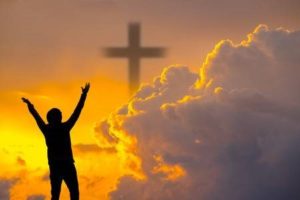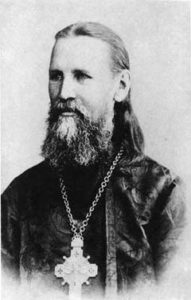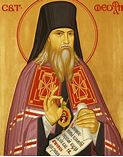SSCORRE!
Saint Sophia Cathedral
Online Resources for our Religious Edification

Topic of the Week – The Triodion
“…If there exists in us even a faint inclination towards things spiritual, then, however deeply we are engrossed in a distracted and busy life, we await with hope and trepidation the approach of the great days of repentance, and each time we hope to step a little higher on that mysterious ladder which lifts our hearts toward heaven.
The great and sad days of Lent are drawing near….“
Excerpted from Diary of a Russian Priest, p145-147
Adult/Family:“…after confession and communion, having cleansed our souls, having experienced tenderness and tears, conscious of new strength within us, we make the resolution to start a new way of life.
But usually, on the very day on which we received Holy Communion, we stumble over trifles, hasten to amend our fault, make further blunders, more and then still more; finally, shrugging our shoulders, we sink for the entire year into our habitual and painful sinfulness.Then, Lent approaches once again; at this very thought the ‘inner man’ awakens within us, hope lives again, and we await once more those blessed and saving days with trepidation and confidence, hoping for a final and secure restoration of our sluggish and sinful soul.But between these intentions and true contrition there stretches a long road, full of many obstacles, which is difficult to traverse. I do not speak of outward obstacles – the excess of business worries, thousands of external reasons: however great, these outward obstacles can be overcome, if we have an inner flame, a thirst for purification, and a sincere resolve to achieve it. Far more serious are the inner difficulties – lack of faith, passions, impurity, and, last but not least, blindness concerning our sins and a ‘petrified insensibility’ – these two things in particular.
- ‘To see your sins in all their multiplicity and hideousness – this is indeed a gift of God’ (John of Kronstadt).
- ‘He who knows his own sin is higher than the man who resurrects the dead by his prayers. He who has been granted the gift of seeing himself is superior to the man who has the gift of seeing angels.’ (St. Isaac the Syrian)
And vice versa – blindness to sin, the failure to see it, is the natural condition of fallen man. We unconsciously hide our sins from ourselves, our Lord himself puts part of our sins out of our view for a time, in order afterwards to throw us into terror and sorrow at the clear sight of the abyss of our impurity. But without a clear view of our sins there is no repentance; and if there is no repentance, there is no salvation. ‘Let me behold my sins’: such is the natural, prayerful sigh of each of us who enters the great season of Lent. To do so, we must not spare ourselves but must renounce ourselves and all our sinful nature…”Excerpted from Diary of a Russian Priest, p145-147
Consider purchasing Thirty Steps to Heaven: The Ladder of Divine Ascent for All Walks of Life for your spiritual reading during Lent
Preschool/Elementary School:
Read about and find activities for the Triodion period here: Triodion resources – Orthodox Pebbles
The Parable of the Publican and the Pharisee
The Parable of the Prodigal Son
Triodion Parables: DIY Fabric Learning Set
Middle School:
“As the sharp edge of winter cuts across February and early March with its long shadows and long cold nights, Orthodox Christians know that this time of year is the herald of Great Lent, that solemn but beautiful 40-day journey to the death and resurrection of our Lord and Savior Jesus Christ.
With anticipation we look forward to that Lenten journey and what awaits us at the end of our spiritual travels — the “feast of feasts,” that great day of Pascha in which we proclaim, “Christ is risen from the dead, trampling down death by death.” We celebrate that Christ has transformed death from a horrible finality to a wonderful passage into eternal life. Great Lent is that great gift given to us by the Church to help us prepare ourselves, to make ready, for the joy which is to come.Great Lent is a time to prepare. So how does the Church aid us in our preparation? It gives us a time to prepare to prepare! The series of Sundays leading up to Great Lent instructs us on what we must take with us on our Lenten journey…”
Read the entire article about Preparing for the Greatest Journey
How are you and your family “preparing to prepare”?
High School:The Church Year of our Holy Orthodox Church begins on September 1st and continues through August 31st. It is divided into three periods based upon Easter, and all the seasons refer to it as their starting point.The three periods are 1) Triodion, which lasts for ten weeks before Easter; 2) The Pentecostarion or Pentecost Season which begins with Easter and culminates after Pentecost Sunday; 3) The Season of the Eight Tones (Octoechos) for the rest of the year.
The TriodionThe first period, the Triodion, derives its names form the fact that during this season the Canons that are sung contain only three odes or stanzas instead of the usual nine.
The Sundays of the Triodion are: Sunday of the Publican and the Pharisee Sunday of the Prodigal Son Sunday of Meat-fare Cheesefare Sunday,
and the Sundays of the Great and Holy Lent: Sunday of Orthodoxy Sunday of Saint Gregory Palamas Sunday of the veneration of the Holy Cross Sunday of Saint John of the Ladder Sunday of Saint Mary of Egypt Palm Sunday (finally closing on Holy Saturday morning)The TRIODIONMany canons in the Triodion contain only three canticles or odes, hence the name Triodion, meaning Book of the Three Odes.The period which the book covers extends from the Sunday of the Publican and Pharisee (the tenth before Pascha (Easter): twenty-two days before the beginning of Great Lent) and concludes with Holy and Great Saturday.The period of time between the Sunday of the Publican and the Pharisee and the Pharisee and Holy and Great Saturday is referred to as the “Triodion”.The first four Sundays of the Triodion (Sunday of the Publican and the Pharisee to the Sunday of Cheesefare [Forgiveness Sunday]) are called Pre-Lent. It is a period set aside by the Church for the preparation for Great Lent.Each Sunday’s theme brings us to the understanding of what true repentance is. From there we move into Great Lent, which consists of Six Sundays. (Sunday of Orthodoxy to Palm Sunday.) This is also a time for preparation as we move closer to Holy Week and Christ’s Saving Passion. We prepare ourselves for Christ’s death, burial, and Resurrection.The THEMES of each week during the PERIOD OF TRIODION are:
SUNDAYS OF PRE-LENT1) SUNDAY OF THE PUBLICAN AND THE PHARISEE – The focus this Sunday is on the Gospel of Luke 18:10-14, in which two men went to the Temple to pray. One was a Pharisee, an externally decent and righteous man of religion, and the other was a publican, a sinful tax-collector who was cheating the people. Though the Pharisee was genuinely righteous under the Law, he boasted before God and was condemned. The publican, although he was truly sinful, begged for mercy, received it, and was justified by God. There is NO fasting this week, in preparation for our great journey.)2) SUNDAY OF THE PRODIGAL SON – On this Sunday in the preparation for Great Lent, Orthodox Christians are read Christ’s parable about God’s loving forgiveness (Luke 15:11-24). They are to see themselves as being in a foreign country far from the Father’s house and to make the movement of return to God, where we truly belong. The parable gives assurance that the Father will receive them with joy and gladness in their journey through Great Lent, their journey home.3) JUDGMENT SUNDAY/MEATFARE SUNDAY – Judgment Sunday is also called “Meatfare Sunday” because it is the last Sunday, according to the fasting canons, that the faithful eat meat before Easter. During the following week, we do not fast on Wednesday and Friday (except for meat, of course). On this Sunday, we call to mind something that has not even happened yet: the Second Coming of Christ. Our Lord has promised us that He will come again “to judge the living and the dead, and His Kingdom will have no end” (from the Nicene Creed). We call to mind the “criteria” of our entrance into Paradise, as our Lord said in today’s Gospel: “I was hungry and you gave me food, I was thirsty and you gave me drink, I was a stranger and you welcomed me, I was naked and you clothed me, I was sick and you visited me, I was in prison and you came to me.”4) FORGIVENESS SUNDAY/CHEESEFARE SUNDAY – Last day of eating cheese products before Easter. People tend to just make it about eating an apple… yet, it’s so much more than that. Forgiveness Sunday is the day the Church remembers the disobedience and expulsion of Adam and Eve in the Garden of Eden. The disobedience was not following God’s command of not eating from the Tree of Knowledge. The sin was not a matter of eating an apple, or whatever fruit it might have been: the sin was going against God’s command.Excerpted from St. Demetrios Orthodox Church Altar Boy Handbook, by Fr. Christos MarsConsider purchasing and reading Meditations for Great Lent – Reflections on the Triodion to learn more.
A Message from Maria Spanos
I am passionate about our Orthodox Christian faith and seek to help others learn as much as they can about it. My purpose here is to share online resources that help strengthen our relationship with Christ and bind us closer to His Church. I believe they are invaluable in learning about our precious Orthodox Tradition, and are a great aid for teaching family members, friends and others about Orthodoxy. ~Maria
Two of my favorite quotes:
 “A true Christian behaves in this life so that it may be a preparation for the future one and not only a life here below. In his actions, he does not think what will be said of him here but of what will be said there in heaven; he represents to himself that he is always in the presence of God, of the angels and all the saints, and remembers that someday they will bear witness of his thoughts, words, and deeds.” — Saint John of Kronstadt
“A true Christian behaves in this life so that it may be a preparation for the future one and not only a life here below. In his actions, he does not think what will be said of him here but of what will be said there in heaven; he represents to himself that he is always in the presence of God, of the angels and all the saints, and remembers that someday they will bear witness of his thoughts, words, and deeds.” — Saint John of Kronstadt
__________________________________________________________

“Of all the holy works, the education of children is the most holy.”
— St. Theophan the Recluse






